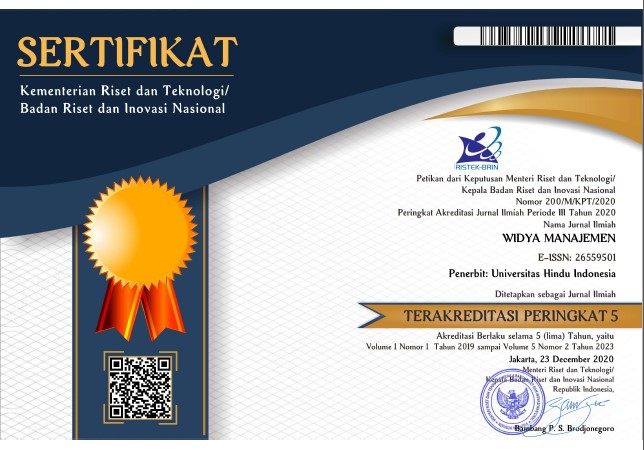Sikap dan Kepedulian Masyarakat Terhadap Objek Wisata dan Pembangunan Berkelanjutan di Bali
Abstract
Indonesia is not only rich in natural resources but because of its exotic landscape, consisting of forests, oceans and rivers that can generate extraordinary natural tourism potential. The development of tourism has two possible impacts on the local community, namely tourism will improve the welfare of the community or on the contrary, tourism will marginalize society in all fields. The activities of developing tourist objects cannot be separated from social, economic and environmental conditions. Tourism is an industry whose survival is largely determined by the merits of the environment.
This research, it examines and analyzes how the attitudes and concerns of the community towards the development of tourist objects towards sustainable development. The goal is to find out how people's attitudes and concerns affect the development of tourist objects and sustainable development. This study uses an explanatory study with literature studies to identify the impact of people's attitudes and concerns towards sustainable development.
Attitudes and behaviors are the formation of perceptions, so a correct perception of an object is needed. With the existence of public concern from the beginning for tourism development, it will further ensure the success and continuation of this tourism development. Continuing development for Bali considers not only the sustainability of natural resources as a basic necessity for life, but also the sustainability of cultural resources.
References
Allport, G. W. (1960). Personality and Social Encounter. Boston, USA.
Andereck, K. L., & Vogt., C. A. (2000). The Relationship between Residents’ Attitudes toward Tourism and Tourism Development Options. Journal of Travel Research, 9(1), 27–36.
Antara, M., & Panning, N. (1999). Keterkaitan antara Pariwisata dengan Pertanian di Bali: Tinjauan dengan Model Social Accounting Matrix. Puslit Kebudayaan Dan Pariwisata Universitas Udayana.
Ardika, I. W. (2003). Pariwisata Bali: Membangun Pariwisata Budaya dan Mengendalikan Budaya Pariwisata. Kajian Pariwisata Program Pascasarjana Universitas Udayana.
Ardika, I. W. (2015). Warisan Budaya Perspektif Masa Kini. Udayana Unversity Press, (Denpasar).
Arif, S. . (1999). Applying Philosophy of Tri Hita Karana in Design and Management of Subak Irrigation System, dalam A Study of Subak as Indigenous Cultural Social, and Technological System to Establish a Culturally based Integrated Water Resources Management, (Universitas Gadjah Mada.).
Bronsteen, J., Christopher, B., & S.M, J. (2009). Welfare As Happiness. The Georgetown Law Journal, 98, 1583.
Bapedalda, P. B., & Travel, N. (2012). Buku Panduan Tri Hita Karana.
Brundtland, R. (1987). Our Common Future (Oxford, ed.). Oxford University Press.
I Gde Pitana., & Putu G, G. (2005). Sosiologi Pariwisata. Yogyakarta: CV Andi Offset.
Kaler, I. G. . (1982). Butir-butir Tercecer Tentang Adat Bali 2. Bali Agung Denpasar.
Lunberg, D. E., M. H. Stavenga, dan M. K. (1997). Ekonomi Pariwisata. Jakarta: PT Gramedia Pustaka Utama.
Mc Intosh, R., & Goeldner, C. (1990). Tourism Principles, Practices, Philosophies. New York: Jhon Wiley and Sons Inc.
Munasinghe, M. (1993). Environmental Economics and Sustainable Development.
Noddings, N. (2003). Happiness and Education (United Sta). Cambridge University Press.
Nugroho, I. (2011). Ekowisata dan pembangunan berkelanjutan. Yogyakarta: Pustaka Pelajar.
Sanim, B. (2006). Pembangunan Sistem Agribisnis Dalam Rangka Pembangunan Pertanian berkelanjutan.
Soetopo, A. (2011). Mengenal Lebih Dekat: Wisata Alam Indonesia. Pacu Minat Baca, 5.
Sukardja, P., & Wirawan, B. (2012). Pemanfaatan potensi sosial Budaya dalam Pembangunan Derah Bali: Pokok-Pokok Perdesaan. Seminar Analisis Krisis Pembangunan Bali.
Swanson. (1991). A deconstruction of caring. Journal of Advanced Nursing.
Thurstone. (1928). Attitudes can be Measured. American Journal of Sociology, 33, 529–540.
Windia, I. W., & Dewi, R. K. (2011). Analisis Bisnis Berlandaskan Tri Hita Karana. Denpasar: Udayana University Press.
Yoeti, & Oka. (1983). Pengantar ilmu pariwisata. Bandung: Angkasa.
Reproduction Policy
Every author submitting articles to Widya Manajemen must make a statement that the manuscript is free from plagiarism and is not being considered and published in other journals.
Articles that have been published are copyrighted by the Program Studi Manajemen FEBP UNHI. For educational purposes, the contents of the article may be duplicated or reproduced as long as the source of the article is mentioned. Written requests must be submitted to the editor to obtain permission to republish the contents of the article for purposes other than educational purposes.
-----------------------------------------------------------------------------------------------------
Kebijakan Reproduksi
Setiap penulis yang menyerahkan artikel ke Widya Manajemen harus membuat surat pernyataan bahwa naskahnya bebas dari plagiarisme dan tidak sedang dipertimbangkan dan dimuat dalam jurnal lain.
Artikel yang telah dipublikasi menjadi hak cipta Program Studi Manajemen FEBP UNHI. Untuk tujuan edukatif, isi dari artikel dapat digandakan atau direpublikasi selama menyebutkan sumber dari artikel tersebut. Permintaan tertulis harus diajukan kepada editor untuk memperoleh ijin merepublikasi isi dari artikel untuk tujuan lainnya selain tujuan edukatif.






.jpg)









